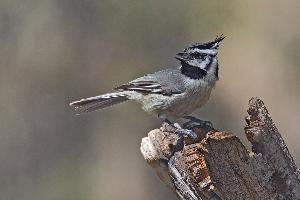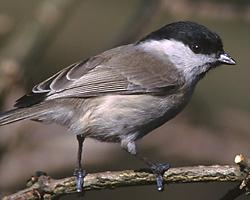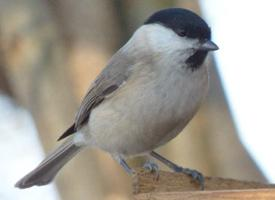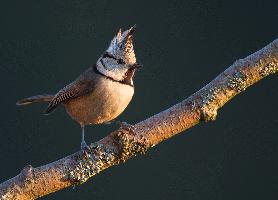
Descrierea animalului
The Bridled Titmouse (Baeolophus wollweberi) is a small, captivating bird that graces the oak and pine-oak woodlands of the southwestern United States and Mexico with its presence. This species is particularly noted for its striking appearance and sociable nature, making it a favorite among birdwatchers and nature enthusiasts.The Bridled Titmouse is easily identifiable by its distinctive head pattern. It sports a striking black and white face, with a black forehead and a white supercilium (eyebrow) that contrasts sharply with its black eye line. This creates a "bridled" look, which is how the bird gets its name. The bird's upper parts are a soft gray, while its underparts are a lighter grayish-white. The flanks may show a wash of buff or pale rust color, adding subtle warmth to its plumage. Its bill is small and black, perfectly adapted for its diet of insects, seeds, and nuts.
Adults typically measure about 5.5 inches in length and weigh around 11 grams. Despite their small size, Bridled Titmice are full of energy and exhibit a remarkable agility as they flit through the trees, often hanging upside down to forage for food on the undersides of leaves and branches.
One of the most endearing qualities of the Bridled Titmouse is its vocal nature. It emits a variety of sounds, from a clear, whistling "peter-peter-peter" to a more complex, burbling chatter when in groups. These vocalizations play a vital role in communication within flocks, especially during the breeding season and while foraging.
Speaking of breeding, Bridled Titmice are monogamous birds that form strong pair bonds. They nest in cavities, which they sometimes excavate themselves in soft or rotten wood, but more often they take over existing holes left by woodpeckers or use natural cavities. The female lays between 3 to 7 eggs, which are white with fine reddish-brown spots. Both parents share in feeding the chicks, demonstrating a cooperative approach to raising their young.
The habitat of the Bridled Titmouse is primarily in the higher elevation forests and woodlands of the southwestern United States, particularly in Arizona and New Mexico, and extending into Mexico. They prefer areas rich in oak and pine-oak, where they can find ample food and nesting sites. Despite their specific habitat preferences, they are quite adaptable and can also be found in suburban areas where these conditions are met.
Conservation-wise, the Bridled Titmouse is currently considered to be of least concern by the International Union for Conservation of Nature (IUCN), thanks to stable population numbers. However, maintaining healthy woodland habitats is crucial for the continued well-being of this species, as it relies on these environments for feeding and nesting.
In summary, the Bridled Titmouse is a small, yet remarkably vibrant bird, known for its beautiful plumage, lively demeanor, and melodious calls. Its presence adds a special charm to the forests and woodlands of the southwestern United States and Mexico, making it a cherished species among those who are fortunate enough to observe it in its natural habitat.
Animale similare
Fotografii noi cu animale
Top 10 animale
- Diana monkey (Cercopithecus diana)
- Dolphin gull (Leucophaeus scoresbii)
- Galápagos tortoise (Geochelone nigra complex)
- Moustached guenon (Cercopithecus cephus)
- Japanese spider crab (Macrocheira kaempferi)
- Colossal squid (Mesonychoteuthis hamiltoni)
- Fox tapeworm (Echinococcus multilocularis)
- Stone loach (Barbatula barbatula)
- Japanese macaque (Macaca fuscata)
- Barbary macaque (Macaca sylvanus)


